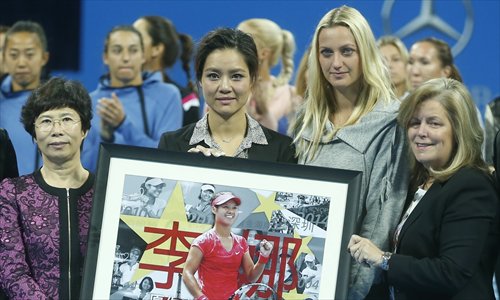There’s only one Li Na
WTA boss praises Chinese star’s contribution to tennis

Li Na (center) poses with (from right) WTA head Stacey Allaster, Czech Petra Kvitova and Hou Yulan, a senior official with the China Open organizing committee, during Li's retirement ceremony on September 30 in Beijing. Photo: CFP
In an interview with the Global Times during the China Open, which concluded last week, Stacey Allaster, chairman and CEO of the Women's Tennis Association (WTA), said she wasn't totally surprised when Chinese tennis great Li Na announced her retirement from the sport.
Chinese fans had high hopes for Li at the inaugural Wuhan Open and the following China Open in Beijing, but were stunned by her sudden announcement to retire on September 19, just two days before the beginning of the tournament in her hometown of Wuhan.
The Chinese star had not played since Wimbledon in June due to a left knee injury which required surgery. Allaster said Li's team had kept her informed about the injury and she knew that Li had been suffering from it for a long time.
"When you have an athlete at 32, you know it could happen. So I wasn't totally surprised when she made her decision," Allaster said.
She also told the Global Times that champion players like Li are prone to call it quits when they know they can't perform at their top level.
"They're not interested in being a journeywoman" at that time because "they want to play at the highest level." When they physically know they cannot do that, "that's when they know it's time to step out."
Strong foundation
Li is the first and only Asian tennis player to win Grand Slam singles titles. She claimed the French Open in 2011, and added a second major title at the Australian Open in January.
Over the course of her career, she won a total of nine WTA singles titles. Her highest ranking of world No.2 is also a record for an Asian player. Her achievements have sparked a surge in the number of tennis players in China.
It is no exaggeration to say that Li has greatly helped expand the popularity of tennis in China as Allaster said "She (Li) inspired a nation."
Now with Li's departure, Allaster is confident that Chinese fans' passion for the sport will be as strong as ever.
A total of 10 WTA events are to be held in China this year - more than any other country around the world. And in 2015, an 11th WTA event will come to Zhuhai, South China's Guangdong Province.
Besides Li, there are currently three other top-100 Chinese players in the WTA rankings: Peng Shuai (22), Zhang Shuai (54) and Zheng Jie (77).
Also thousands of young girls in China are playing tennis right now; they "want to be the next Li Na, and realize their dreams on the international stage. So I see that with a strong foundation, we'll stand on strong shoulders. We will make her proud, and women's tennis has a bright future thanks to Li Na," Allaster said.
Next big star
Right now, Chinese fans are curious about who will be able to take over from Li in the post-Li Na era to become China's next world-class tennis player. Allaster thinks "time will tell," and she said Peng has a chance to achieve that.
Peng has long been known as one of the world's best doubles specialists, having claimed 17 WTA doubles titles, including two Grand Slam titles with Chinese Taipei's Hsieh Su-wei, with the pair reaching a career high of world No.1 in doubles in February.
But Peng's performance in singles matches hasn't been so impressive, and she is yet to win a WTA singles title in her career.
However, she made a surprising breakthrough at the US Open last month by reaching her first Grand Slam singles quarterfinal and semifinal.
She defeated compatriot Zheng Jie, fourth-seeded Agnieszka Radwanska, 28th-seeded Roberta Vinci, 14th-seeded Lucie Safarova and rising star Belinda Bencic, all in straight sets.
However, she was forced to retire after suffering severe cramps when going against 10th seed Caroline Wozniacki 6-7 (1/7), 3-4 in the semifinal.
Allaster said Peng's performance in New York was "fantastic" and "remarkable," and that her "talent is there." She thinks Peng is "absolutely" able to repeat her feat at the US Open in future tournaments.
"It's moments like that that build confidence," and "the US Open gave her a lot of confidence in herself in the game to help her achieve additional goals."
When asked how long it will take for Chinese fans to find another superstar, Allaster said Li is irreplaceable, "Without question there is only one Li Na; she has inspired so many current stars and future stars of the WTA." She believes another Chinese superstar will emerge someday, but Li is unique.
Long way to go for men
Compared to the achievements of Chinese female players, their male counterparts have a longer way to go.
Right now the two best Chinese male players are world No.190 Zhang Ze and No.230 Wu Di. Their best performances in major tournaments have only reached first-round appearances at the Australian Open.
Wu made it to the main draw of the Australian Open in 2013 and 2014, by winning the Asia-Pacific Australian Open Wildcard Playoffs. Zhang qualified for the 2014 Australian Open through qualifying rounds.
Allaster said it is possible that Chinese men will have a breakthrough.
"Professional tennis is incredibly competitive, it just takes a lot of perseverance and dedication, and no one had predicted that Li Na would win the Grand Slam in 2011, so it is possible," Allaster said.